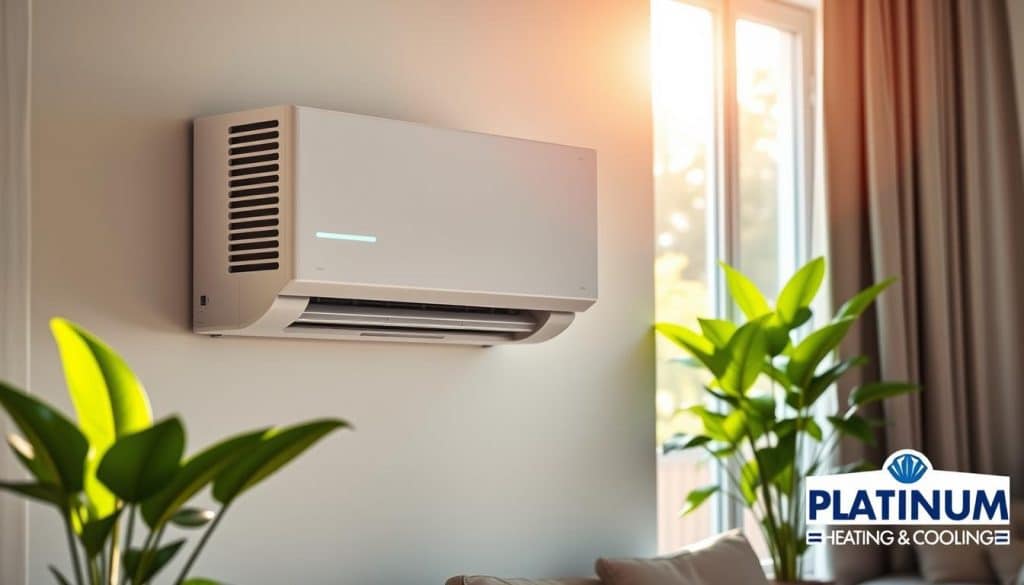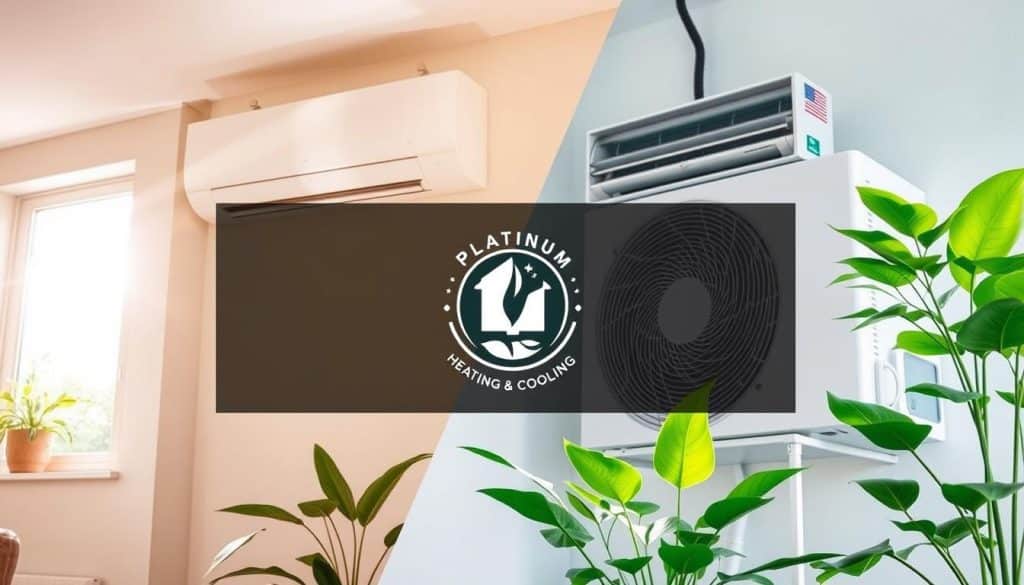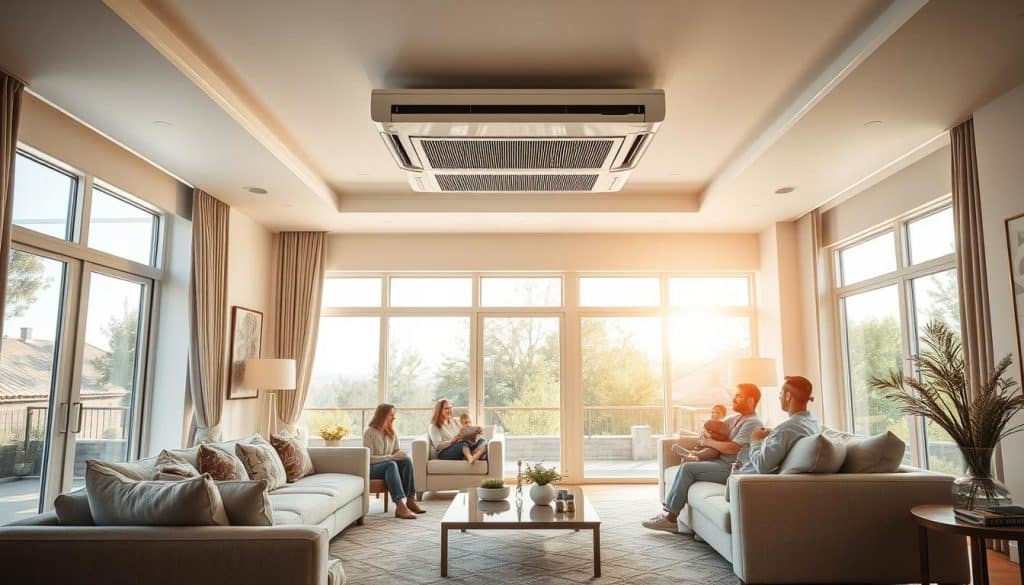Table of Contents
Ever wondered How Do Apartment AC Systems Differ From Central AC? Today, choosing between apartment cooling options like ductless AC units and central HVAC systems is key. Central AC systems differ in more than just where they’re placed. They also vary in installation needs, energy use, and how happy tenants are.
Choosing the right AC system for an apartment is very important. It affects how comfortable people are, how much it costs to run, and how much work property managers have to do. Knowing the differences between these systems can help you pick the best one for your building and its people.
Key Takeaways
- Central AC systems often provide better circulation and quieter operation, enhancing tenant comfort.
- Apartment cooling options like ductless AC units may reduce costs and increase energy efficiency by avoiding the need for extensive ductwork.
- HVAC systems require precise installation and maintenance, impacting the overall convenience and operational costs.
- Understanding the central AC differences can guide property managers in making a more tailored and efficient choice.
- Tenant satisfaction can heavily influence the decision, as certain systems offer more individual control over the living environment.
- Geographic location and building architecture play crucial roles in determining the most suitable cooling solution.
Introduction to Apartment AC Systems and Central AC
The world of air conditioning has many systems for different needs. It’s key to know these systems to pick the best for your space, whether it’s an apartment or a bigger home.
Definitions of Apartment AC Systems
Apartment AC systems include various types made for cooling specific areas. You’ll find window air conditioners, portable air conditioners, PTAC (Packaged Terminal Air Conditioner) units, and ductless mini-split systems. Each has its own benefits and fits different cooling needs and setups.
Window air conditioners fit in a window and cool one room well. Portable air conditioners can move from room to room, offering flexibility. PTAC units are great for hotels and apartments, providing both heating and cooling efficiently. Ductless mini-split systems cool different areas with one outdoor unit, saving energy.
Definitions of Central AC Systems
Central AC systems cool entire homes or buildings through ducts. They come as split systems or packaged systems, part of the building’s HVAC. Split systems have indoor and outdoor parts, while packaged systems have everything outside. Central AC systems cool evenly and are good for big spaces.
Importance of Choosing the Right AC System
Choosing the right AC system is crucial for comfort and efficiency. It’s important to pick one that fits your needs, space, and energy goals. The right AC system can save energy, improve comfort, and cut costs.
Getting help from experts like those at Platinum Heating & Cooling is wise. They know all about AC systems for homes and businesses. They’ll help you find the perfect system for your needs. The right AC system means long-term savings and comfort.
How do apartment AC systems differ from central AC?
Knowing the differences between apartment AC systems and central AC is key. It helps homeowners choose the right AC system. Each system has its own installation process and energy efficiency.
Differences in Installation
Installing apartment AC systems can be different. Window air conditioners and portable units are easy to set up. But, ductless mini-split systems need professional help and are more complex.
Central AC systems are more involved. They need to connect with existing ductwork. This makes them more expensive to install but offers a smooth cooling solution.
Energy Efficiency Comparisons
Central AC systems are often more energy-efficient, especially for big buildings. They use fewer units, saving on electricity bills. They also use advanced tech to save energy over time.
Apartment AC systems have their own energy-saving benefits. They can cool specific areas well. This can lower energy use if managed right.
Types of Apartment AC Systems
Apartment AC systems come in many types, each suited for different needs. Knowing their features and benefits helps in choosing the right one for your home.
Window Air Conditioners
Window air conditioners are a cost-effective and efficient choice for small spaces. They’re easy to install and fit standard windows. But, they can be noisy and block the view or light.
Portable Air Conditioners
Portable AC units are great for moving around. They’re simple to set up, needing only an exhaust hose. Yet, they might not cool large areas as well as other systems.
Ductless Mini-Split Systems
Ductless mini-splits are perfect for quiet, flexible cooling without ductwork. They have an outdoor unit and indoor air-handling units. Though they cost more to install, they’re very efficient and great for rooms without ducts.
PTAC Units
Packaged Terminal Air Conditioner (PTAC) systems are often used in hotels but work well at home too. They’re installed through the wall for room-by-room temperature control. However, they might not cool big areas well due to their limited capacity.
Advantages and Disadvantages of Central AC
Central AC systems have many benefits. They keep the temperature even in every room. This means you can enjoy a comfortable climate everywhere.
They also work quietly. The noisy parts, like compressors and fans, are outside. This makes your home quieter and more peaceful. Plus, they look better than window units, keeping your home looking nice.
But, central AC systems have downsides too. Getting one installed can cost a lot, especially in older homes. Keeping it running well also costs money over time. Companies like Platinum Heating & Cooling can help. They offer services like AC repair and installation, making sure you get the most out of your central AC.
Decision Factors for Choosing Between Apartment and Central AC
Choosing between apartment AC systems and central AC involves several key factors. These include cost, maintenance, energy efficiency, and the perks of zoned cooling.
Cost Considerations
AC system costs differ between apartment and central AC. Central AC needs a bigger upfront investment for equipment and installation. Yet, it can save money in the long run because it’s more efficient. On the other hand, apartment AC units are cheaper at first but might cost more for energy over time.
Maintenance Requirements
HVAC maintenance is essential for both systems. Central AC systems often need professional care and might be covered by state laws for repairs. Apartment AC units are simpler to maintain but might need more repairs because they’re portable.
Energy Efficiency
Energy efficiency is key. Thanks to new tech, energy-saving AC units are easier to find. Brands like MRCOOL offer designs that improve air flow, cutting down energy use and bills.
Zoned Cooling Benefits
Apartment AC systems, especially ductless mini-splits, offer zoned cooling. Zoned HVAC systems let you set different temperatures in different areas. This boosts comfort and saves energy, unlike central AC which cools everything the same.
For expert advice and installations, reach out to Platinum Heating & Cooling at (616) 229-0444 or office@platinumheatingmi.com.
Conclusion
Understanding the difference between apartment AC systems and central AC is key. It affects everything from energy bills to how happy your tenants are. Knowing about energy efficiency, how hard it is to install, and upkeep needs helps make smart choices for any size property.
Talking to HVAC pros is a smart move. They help figure out the best air conditioning for your place and budget. Their advice is crucial for making choices that last and are good for the planet.
Choosing between central AC and apartment units depends on your needs. Working with a trusted company like Platinum Heating & Cooling ensures your AC works well. They offer services for homes and businesses, keeping places comfy all year. Picking the right AC means finding a balance between now and later, with help from experts who care about your comfort.



